

Dóchas on Tax Justice. Double Irish arrangement. The double Irish arrangement is a tax avoidance strategy that multinational corporations use to lower their corporate tax liability.
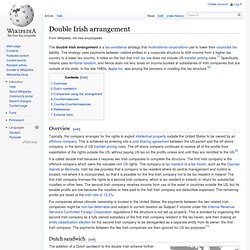
The strategy uses payments between related entities in a corporate structure to shift income from a higher-tax country to a lower-tax country. It relies on the fact that Irish tax law does not include US transfer pricing rules.[1] Specifically, Ireland uses territorial taxation, and hence does not levy taxes on income booked at subsidiaries of Irish companies that are outside of the state. In the late 1980s, Apple Inc. was among the pioneers in creating this tax structure.[2] Overview[edit] Typically, the company arranges for the rights to exploit intellectual property outside the United States to be owned by an offshore company. It is called double Irish because it requires two Irish companies to complete the structure. Dutch sandwich[edit] Double Irish With a Dutch Sandwich – example 1. Ireland, Tax and Development. No more “Dutch Sandwich”? The Netherlands reviews its role in tax avoidance.
In recent years, governments have become increasingly aware of the fact that lots of major corporations—notably tech companies including Apple, Google, Yahoo, Dell, and many others—are using shady, albeit legal, techniques to shift income in ways that drastically minimize a company's tax burden.

A trick known as the “Dutch Sandwich,” in which companies move money through the Netherlands, has become one of the preferred ways of reducing a firm's financial liability. On Wednesday, a Dutch parliamentary committee met to consider the fairness of its own tax system and re-evaluate its role as part of a legal financial chain that allows companies to reduce the amount of tax they pay. In December 2012, Google was found to have moved $10 billion from Ireland via the Netherlands to Bermuda—avoiding huge sums of taxes in Ireland, the Netherlands, and its real home country, the United States. “If they go somewhere else we are not sorry at all because they spoil the name of Holland,” Groot added. Tax campaigners study multinationals' enthusiasm for going Dutch. In the centre of Rotterdam lies the Cool district, well known for its bars, cafes and cinemas.
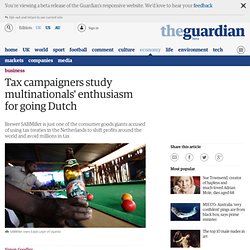
Less well known, though, is a small office used by 10 employees of SABMiller, the London-listed drinks giant behind beer brands such as Grolsch and Peroni. And this discreet group must be among the company's most productive staff. The only time these workers see a bottle of Grolsch is probably when they go to one of those nearby bars, but even so the subsidiary they work for, SABMiller International BV, made a post-tax profit of $78m in 2011 on revenues of $104m.
Tax evasion, tax avoidance and tax expenditures in developing countries: A review of the literature. Authors: Fuest, C.; Riedel, N.
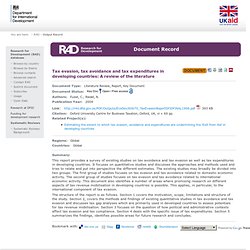
Citation: Oxford University Centre for Business Taxation, Oxford, UK, vi + 69 pp. How tax dodging hurts the poor. Tax evasion keeps the developing world poor. Hilary Benn, the secretary of state for international development, last Thursday called for rich countries to assist poorer ones in setting up and maintaining systems of universal healthcare, to back 10-year plans for education and to help create lifelong social security systems.
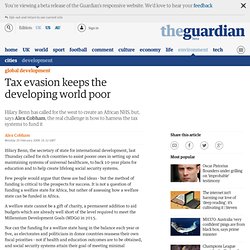
Few people would argue that these are bad ideas - but the method of funding is critical to the prospects for success. It is not a question of funding a welfare state for Africa, but rather of assessing how a welfare state can be funded in Africa. A welfare state cannot be a gift of charity, a permanent addition to aid budgets which are already well short of the level required to meet the Millennium Development Goals (MDGs) in 2015. Loading these worthy goals onto an already overburdened aid agenda risks further undermining effectiveness. The Missing Millions. Bill Nighy: tackle tax avoidance to put an end to world hunger - World Politics - World. The figures, released days after the Prime Minister said tackling tax avoidance was one of the UK's priorities for its G8 presidency, put the scale of the issue worldwide into perspective.

The actor and tax campaigner Bill Nighy told The Independent on Sunday last week they were "breathtaking". He added: "[Developing countries] lose three times as much to tax havens as [they] receive in aid every year. [Hunger and poverty] are not inevitable. They are completely preventable. When you think about how these things happen – you look at that one fact, and understand how. " Tax Evasion and Tax Avoidance in Developing Countries: The Role of International Profit Shifting. Share: MyIDEAS : Login Powered by Translate Abstract.
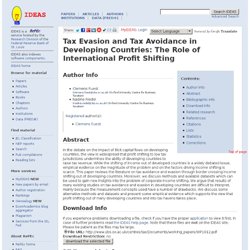
Examples of Google, Starbucks, etc. Taxation and tax evasion and achieving the MDGs. Taxation and tax evasion and achieving the MDGs Commissioner Piebalgs, together with President of the African Development Bank Donald Kaberuka will chair a side level event on the margins of the UN Summit on the Millennium Development Goals (MDGs) (New York, 1.00 – 3.00 p.m. local time).
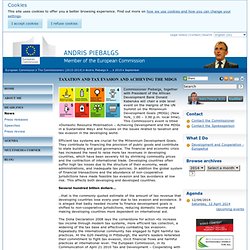
Norway Takes Lead in Combating Tax Evasion in Developing Countries - The Nordic Page - Economy. Government introduces new measures to combat tax evasion in developing countries.
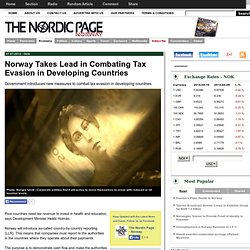
Keep Updated with the Latest News and Feeds, Follow Us on Facebook Poor countries need tax revenue to invest in health and education, says Development Minister Heikki Holmås. Norway will introduce so-called country-by-country reporting (LLR). This means that companies must report to the authorities in the countries where they operate about their payments. The purpose is to demonstrate cash flow and make the authorities in those countries where companies operate responsible for the use of revenues from their natural resources. - I am proud that Norway is going ahead to combat tax evasion.
The European Commission proposed LLR legislation to be currently considered by the Council and European Parliament. Norway plans to introduce national rules on LLR from 1 January 2014, even if implementation in EU is done later. OECD on Effective Tax.